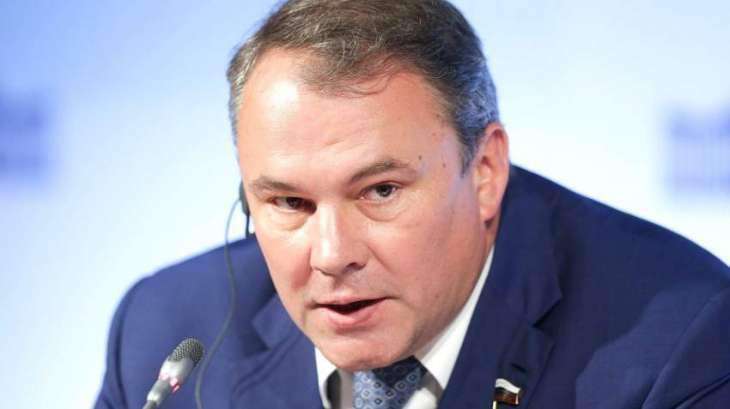Petr Tolstoy, the deputy chairman of the Russian lower house, told Sputnik on Tuesday that he hoped that Kirill Vyshinsky, the executive director of the Rossiya Segodnya International Information Agency, and Sputnik Estonia's editor-in-chief, Elena Cherysheva, would be able to bring attention to the encroachment on the media freedom in Ukraine and Estonia by their speeches at the Parliamentary Assembly of the Council of Europe (PACE).
STRASBOURG (Pakistan Point News / Sputnik - 28th January, 2020) Petr Tolstoy, the deputy chairman of the Russian lower house, told Sputnik on Tuesday that he hoped that Kirill Vyshinsky, the executive director of the Rossiya Segodnya International Information Agency, and Sputnik Estonia's editor-in-chief, Elena Cherysheva, would be able to bring attention to the encroachment on the media freedom in Ukraine and Estonia by their speeches at the Parliamentary Assembly of the Council of Europe (PACE).
On Monday, Rossiya Segodnya announced that Vyshinsky and Cherysheva will participate in the PACE winter session, scheduled for January 27-31. Later on Tuesday, the participants will discuss the report on threats to media freedom by the United Kingdom's George Foulkes, the PACE general rapporteur on media freedom and the safety of journalists. Tolstoy noted that while preparing his report, Foulkes had neither talked to the Russian media community nor visited the country. Foulkes also relied on the data received from various non-government organizations, pursuing their own agendas, according to the Russian lawmaker.
"With that in mind, I hope that Sputnik Estonia's editor-in-chief, Elena Cherysheva, and Executive Director of the Rossiya Segodnya International Information Agency Kirill Vyshinsky, who have arrived in Strasbourg today, will be able to say their piece on the PACE platforms. We want to inform our European colleagues about our stance regarding George Foulkes' report, as well as the media freedom situation in Ukraine and the Baltic countries," Tolstoy, who heads the Russian delegation to the PACE, said.
Vyshinsky himself experienced the violation of his rights by Ukrainian authorities. In May 2018, when he was the head of the Kiev-based RIA Novosti Ukraine online portal, he was detained on suspicion of committing treason and supporting the self-proclaimed republics in the conflict-torn Donbas region of Ukraine. The journalist was freed on September 7, 2019, during a simultaneous release of detained and convicted persons by Russia and Ukraine. Upon arriving in Russia, Vyshinsky became an executive director of Rossiya Segodnya.
Another case of pressure imposed on journalists by the authorities has been faced by Sputnik Estonia. Last October, the outlet's employees were threatened with criminal prosecution by Estonian police unless they ended their employment at Rossiya Segodnya, which Sputnik Estonia is part of. The Baltic country's authorities cited the EU sanctions against several Russian nationals, including Dmitry Kiselev, the head of Rossiya Segodnya, as a reason behind their move. However, Rossiya Segodnya is not owned by Kiselev, as it is not a private organization, and does not appear on any sanctions lists.
Cherysheva told Sputnik on Tuesday that she would do everything in her power to inform the "whole world" about Tallinn's pressure on Sputnik Estonia during her speech at PACE.
"I will do everything possible in order for the whole world, all European international human rights organizations, and other serious organizations to learn about the lawlessness of the Estonian authorities toward Russian journalists. I want everyone to know that in the European country that positions itself as a democratic, official government and the police threaten journalists with criminal cases only because they work in Rossiya Segodnya," Cherysheva said.
She also emphasized her readiness to prove her words and tell listeners all the important details of the situation.
"I'm even ready to take the letter from the police with me to prove what the police refer to when they are threatening us with criminal cases, how they switch personal sanctions from one person to a whole Russian state-owned enterprise. Maybe they should read it," Cherysheva added.
In December 2019, Russian President Vladimir Putin has stated that Russia would do everything in its power to support Sputnik's work in other countries. Moreover, Reporters Without Borders (RSF) started investigating the situation with Russian media in Estonia after Rossiya Segodnya sent the RSF a letter describing developments around Sputnik Estonia.




